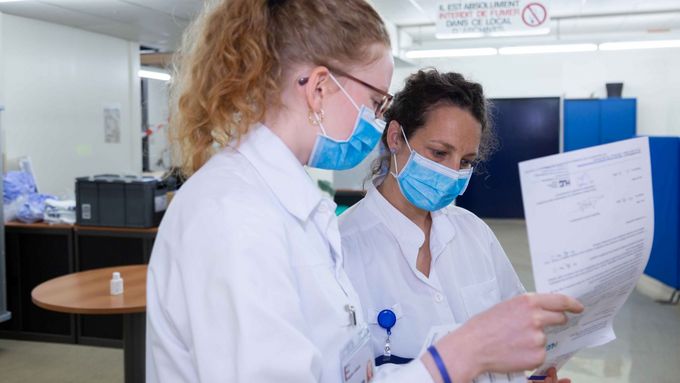Trial Launched to Test Prophylactic Treatments for COVID-19 Contact Persons
23.04.2020
With the easing of measures, there is a pressing need for tools and approaches to contain potential new COVID-19 outbreaks. Academic partners in Geneva and Basel joined forces to launch a clinical trial to test two drugs for the prophylactic treatment of people who were in contact with newly confirmed COVID-19 patients.

The new clinical trial will test two drugs for the prophylactic treatment of COVID-19 contact persons. (Photo: Louis Brisset, University Hospitals Geneva)
With the stepwise easing of measures in Switzerland, it is pivotal to monitor for any new COVID-19 outbreaks and to contain them in a timely and effective manner. Today, a clinical trial was launched simultaneously in Geneva and Basel to assess the efficacy of two drugs in the treatment of people who were in close contact with newly confirmed COVID-19 cases.
Treating contact-persons of an index patient preventively is called post-exposure ring chemoprophylaxis. “Post-exposure prophylaxis could be a pragmatic approach to contain or slow new outbreaks at an early stage,” said Alexandra Calmy, Head of the HIV Unit, Division of Infectious Diseases at the University Hospitals Geneva, who leads the project. “Protecting contact persons from getting sick is not only desirable from an individual’s point of view but could also prove an innovative public health approach.”
The COVID-19 Post-Exposure Prophylaxis (COPEP) project is a collaboration between the University Hospitals Geneva, the University Hospital in Basel, and the Swiss Tropical and Public Health Institute (Swiss TPH). COPEP is funded with a grant from Edmond de Rothschild, l'Union Bancaire Privée, la Fondation pour la Recherche et le Traitement Médical and the Private Foundation of the Geneva University Hospitals. The study will assess the efficacy of two drugs by enrolling more than 400 people who were in close contact with newly diagnosed COVID-19 patients.
Testing two repurposed drugs
The contact persons will be randomly allocated into one of three groups. In the first group, study participants will be administered a single-dose of the antimalarial drug hydroxychloroquine. Participants in the second group receive the anti-HIV drug lopinavir/ritonavir for five days. Participants in the third group will not be administered any of these two repurposed drugs. All study participants will be monitored on a daily basis for COVID-19 symptoms.
Three weeks after enrolment, investigators will check if participants developed infection and, if so, how severe the infection was. “If one or both of the two repurposed drugs should prove efficacious, this would allow us to react rapidly when new cases emerge thereby helping us to flatten the feared second and third waves of the pandemic,” said Niklaus Labhardt, Research Group Leader at Swiss TPH, and Senior Physician at the University Hospital Basel.
Media contacts:
- Swiss Tropical and Public Health Institute (Swiss TPH), Sabina Beatrice-Matter, Head of Communications, +41 79 737 9158, sabina.beatrice@swisstph.ch
- University Hospitals Geneva (HUG), Service de presse et relations publiques, +41 22 372 37 37, presse-hug@hcuge.ch
Stay connected
Subscribe to our newsletter and get all the latest research news, project updates, course and event listings from Swiss TPH.